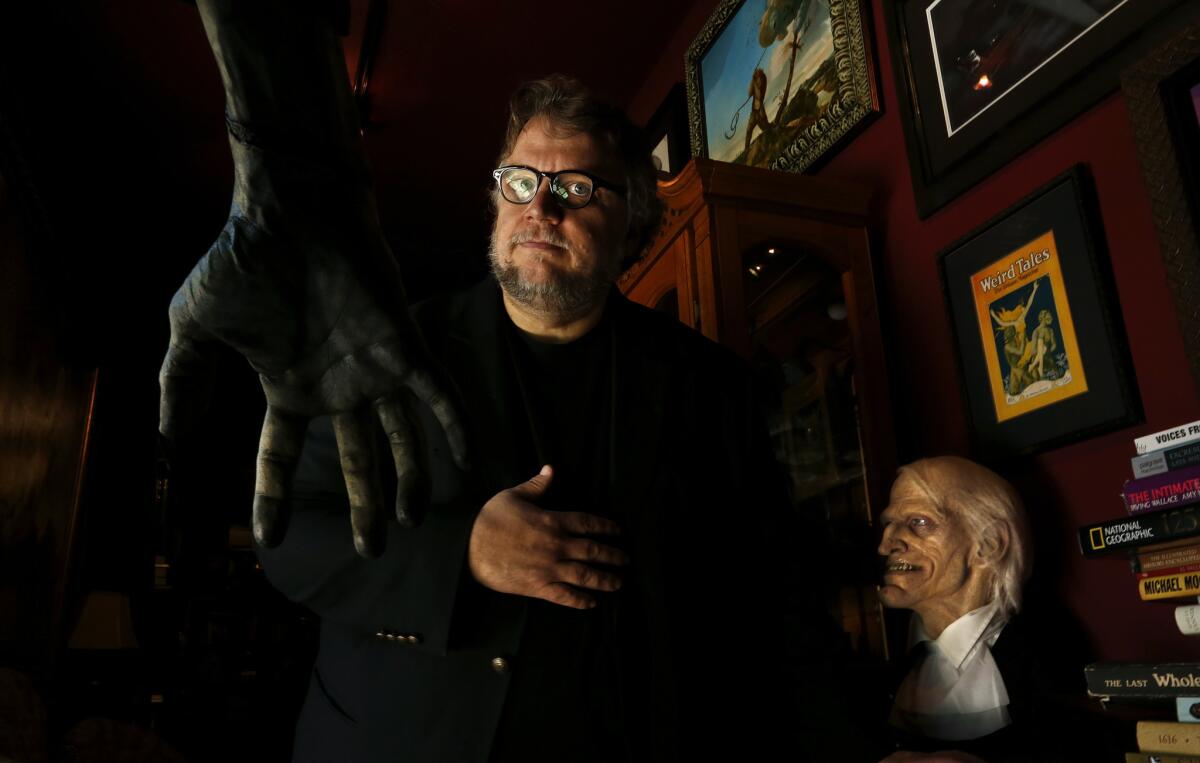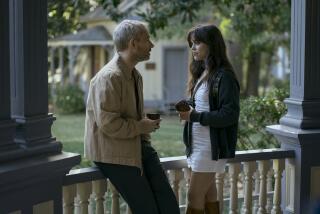Newsletter: Indie Focus: Friends, love and magic with ‘Absolutely Fabulous,’ ‘Summertime’ and Guillermo del Toro
Hello! I’m Mark Olsen, and welcome to your weekly field guide to a world of Only Good Movies.
In last week’s newsletter, we featured the new Woody Allen film, “Café Society,” a melancholy comedy set in Hollywood and New York in the 1930s. I subsequently published an essay wrestling with Allen in the past and present and all the conflicting, troubling feelings he and his work continue to generate. In sum, “Woody Allen does not make it easy to be a fan of Woody Allen.”
Our screening Q&A this past week with James Schamus for his directorial debut, “Indignation,” was really special. We’ll have another event coming up in a few weeks with “The Intervention.” Check events.latimes.com for more info.
Nonstop movies. Movies nonstop.
‘Absolutely Fabulous: The Movie’
If this has been a summer that has seen a number of long-in-the-works sequels come out, it is perhaps fitting that we should also get “Absolutely Fabulous: The Movie,” a big-screen adaptation of the intermittently long-running British television comedy that had its real heyday in the ’90s. Starring Jennifer Saunders and Joanna Lumley — Saunders also wrote the screenplay — the movie finds them returning to their characters of Edina and Patsy, unexpected avatars of the self-centered bad behavior that has since become oddly commonplace.
Which is to say the characters are a hoot to hang out with. In her review for The Times, Rebecca Keegan said, “The real joy in ‘Absolutely Fabulous,’ as ever, comes from the charisma between Saunders and Lumley. Long before ‘Bridesmaids’ or ‘Broad City,’ or the refreshing female friendships on display in recent movies like ‘Ghostbusters’ and ‘Love & Friendship,’ Edina and Patsy were the kind of naughty co-conspirators who managed to mock the absurd cultural expectations of women just as they scrambled to attain them.”
Manohla Dargis, in the New York Times, noted, “Crucial to the movie and series both is that they lampoon Eddy and Patsy even as they go after the world that made them, which allows you to giggle at the characters and lets them, more or less, have the last Champagne-soaked laugh. Their laughter may be self-delusional, but their unbreakable bond means that at least they’re clueless together.”
Saunders and Lumley spoke to Interview magazine about the return of the characters of Edina and Patsy.
‘Summertime’
French filmmaker Catherine Corsini’s “Summertime” is a lesbian romance set amid the female liberation movement of the early 1970s, smartly combining the personal and political.
As Kenneth Turan put it in his review for The Times, “Artfully calculated and authentically felt, the unexpectedly effective ‘Summertime’ combines the conventional structure of classic movie romance with a sensual same-sex frankness that couldn’t be more up to date.”
He also singled out actresses Cécile de France and Izïa Higelin, saying they “play their parts like they were living them, and that counts for a lot.”
Writing for the A.V. Club, Mike D’Angelo said that “for a while, ‘Summertime’ seems to be as much about the French second-wave feminist movement as it is about its central romance … [and] captures the unruliness of the era while avoiding both melodrama and didacticism, the twin pitfalls that afflicted last year’s drab ‘Suffragette.’”
At the Village Voice, Melissa Anderson placed the film in distinction from “Blue Is the Warmest Color” by noting that it “celebrates erotic abandon but never loses its mind … lusty without being overwrought.”
Stephen Saito has a really informative interview with Corsini over at his site the Moveable Fest that delves deep into the film’s intersections with her own life.
Guillermo Del Toro at LACMA
The illustrious Los Angeles County Museum of Art is going to have a museum exhibition featuring artifacts drawn from filmmaker Guillermo del Toro’s extensive collection of items from his own work and movie history. There will be two film series to go along with it, one of del Toro’s own work and another of films that have influenced him.

On July 29, the series of Del Toro’s own work kicks off with his 2001 film “The Devil’s Backbone” — in 35 mm, no less — which he has often declared one of his favorites of his own work. By turns spooky and charming, the film’s mixture of supernatural horror with the human terrors of war is distinctively chilling. Del Toro is scheduled to appear at the screening.
The series goes on hiatus after the “Devil’s Backbone” screening, coming back in October. Don’t be surprised if we talk more about Del Toro then. His more recent work, including the “Hellboy” films, “Pacific Rim” and “Crimson Peak,” are fantastic examples of a filmmaker able to rend the machinery and technology of contemporary big-budget studio filmmaking to create idiosyncratic visions.
Jacques Rivette and Andrzej Żuławski
One might not necessarily link the films of Jacques Rivette and Andrzej Żuławski, but as fate would have it, there are two overlapping film series in Los Angeles that spotlight their work with a particular emphasis on their distinctive visions of magic and mysticism.
Rivette died earlier this year at age 87, and a new series screening four films as his “Dream Cycle” is getting underway in Los Angeles, with some events at the Bob Baker Marionette Theater. Included in the series are “Duelle” and “Noroit,” both from 1976, “Merry-Go-Round” from 1981 and what may be his most emblematic work, 1974’s “Celine and Julie Go Boating.” All four films explore his interest in breaking down narrative conventions to create something at once challenging and intuitive.
Żuławski, Polish-born and who also died earlier this year at 75, has had his reputation moving closer and closer in from the cult fringes for some time now. A new tribute series spotlights that there is a power beyond logic to films such as his 1981 “Possession,” starring Isabelle Adjani and Sam Neill, which is screening in a recent 35mm restoration. Also showing will be recent DCP restorations of 1971’s “The Third Part of the Night,” 1972’s “The Devil,” 1977’s “On the Silver Globe” and his final film, 2015’s “Cosmos.” It’s exciting that a filmmaker like Żuławski can have his work be more widely seen and find a new acceptance without somehow becoming normalized. People like it exactly for just how out there it was and remains.
Email me if you have questions, comments or suggestions, and follow me on Twitter @IndieFocus.
More to Read
Only good movies
Get the Indie Focus newsletter, Mark Olsen's weekly guide to the world of cinema.
You may occasionally receive promotional content from the Los Angeles Times.







